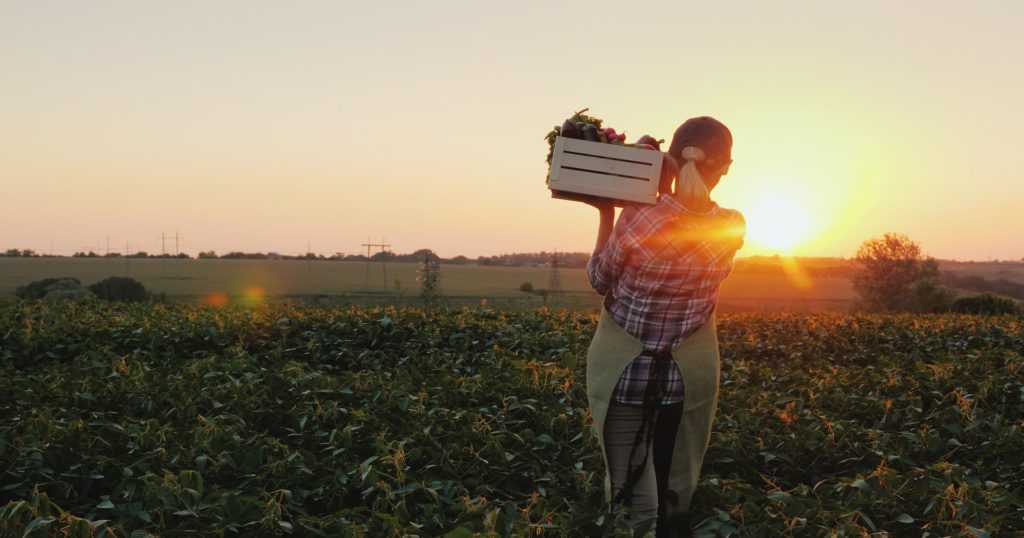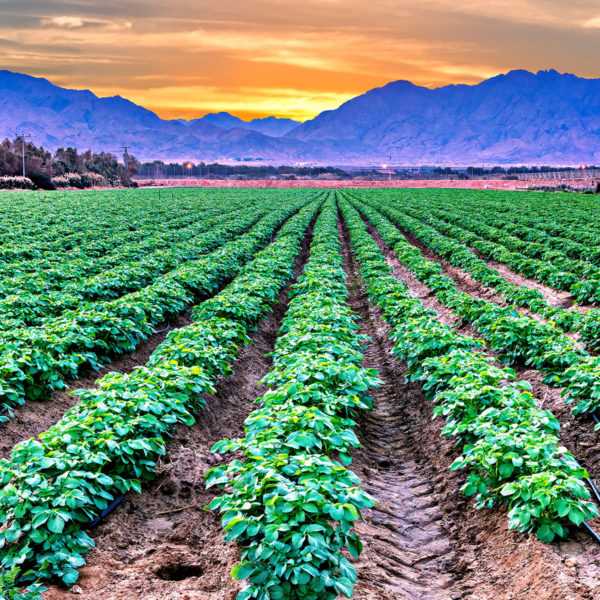Women Entrepreneurs in Agriculture: Breaking Through the Grass Ceiling


Women owners and leaders are gaining ground in the agriculture sector on multiple fronts, albeit at a pace that still has significant opportunity to accelerate.


According to the latest Census figures, women make up 50.8% of the U.S. population. Yet only 14% of principal farm operators are women, according to a 2020 U.S. Department of Agriculture report. The number of women-led farms in the U.S. nearly tripled between 1982 and 2007, according to a 2013 USDA report.
In the agricultural food technology subsector (“agrifoodtech”), the number of startups has risen considerably. This space spans everything from automatic sensors, robotics, and drones for mapping farms and spraying them with fertilizer, to soil testing kits. Venture capital firm AgFunder found that, among the number of startups for which it has gender data, just 9% of the 259 agrifoodtech companies launched in 2002 had a woman founder or co-founder. In 2020, 22% of 1,061 agrifoodtech startups had a woman founder.
Here are the professional stories of four women running four distinct agriculture-related enterprises: a grower; a nutrient supplier; a data provider; and a communications specialist. Their experiences and careers may offer insights into the opportunities and obstacles that other women entrepreneurs may encounter.
LAURA SWANTON: LAURA MICHAEL WINES
Laura Michael Wines is a small winery and vineyard estate in Calistoga, part of the Napa Valley region of northern California. The 3.25-acre property supplies approximately 25% of the grapes that go into Laura Michael Wines, with four other vineyards providing the rest of the harvest. This supply generates 1,600 cases of wine a year across seven varieties of reds and whites, which come in an assortment of vintages. From planting to barreling to bottling, it can take a decade for grape seeds to become wine that customers drink.
Laura Swanton was a sales specialist for Cisco Systems in 1999 when she purchased the estate, whose vineyard initially was planted in 1980. A couple of years later she committed to the winery and vineyard full-time. Swanton conducted extensive renovations to enhance grape crush pads, fermentation tanks, and other equipment for her new venture. She was able to keep on essential workers who had been with the estate before her ownership. This helped her get up to speed as she spent the next several years learning everything she could about the science of growing grapes and the economics of selling wine.
“Between Napa and Sonoma Counties there is a lot of female leadership in this industry, although there is not necessarily a lot of female ownership,” Swanton says. Early on, she had to make some of the men working the vineyard get over their reluctance about taking orders from a woman. She also had to figure out how to turn around what began as an unprofitable enterprise. In 2006, she brought on a new business partner, Michael Swanton, whose background in engineering and power generation proved crucial to maximizing efficiency at the winery and vineyard. They married a few years later and continue to run the company together today.
Along the way they have refined how Laura Michael Wines sells its products, overcoming everything from perennial drought to the COVID-19 pandemic. The company sells direct to customers, both online and in-person to visitors at the estate, many of whom imbibe at their tasting room. Online orders account for most of the revenue, through subscriptions to their wine club. Laura Michael Wines ships nationwide, with licenses in 45 states. Swanton also had been selling wine to wholesalers and in restaurants and stores, until she and Michael calculated that they could increase margins by eliminating those distribution channels.
Prior to the pandemic, in-person visitors accounted for more than 33% of their revenue. When COVID-19 social distancing precautions and government-mandated lockdowns removed that revenue stream from March 2020 to May 2021, Swanton reached out to previous customers and contacts to promote the online subscription channel. This campaign, along with state and federal pandemic-related payments, enabled them to stay in business without suffering permanent losses. “Now we’re looking forward to hosting a 75-person private event for our wine club members in September,” Swanton says. “We want to make them happy.”
TINIA PINA: RE-NUBLE
Re-Nuble make eco-friendly nutrients for soilless indoor growing systems using vegetative waste from food manufacturing that has no more value for human consumption. Its main product, Away We Grow, serves as a direct replacement for synthetic mineral salts. Re-Nuble customers consist of greenhouses, vertical farms, and other farms that grow crops in a highly controlled environment, as well as retailers that sell Re-Nuble products to end consumers who cultivate personal indoor gardens.
“Our mission is to reduce the agriculture and food value chain dependence on synthetic mineral salts, which contribute to 3% of global greenhouse gas emissions,” says Tinia Pina, CEO of Re-Nuble. She founded Re-Nuble in 2012 and made it her full-time career in 2015, upon receiving seed funding from the venture capital firm SOSV. Pina is based in New York City and the 6,300-square-foot Re-Nuble manufacturing facility is located in Rochester, N.Y. The company has four full-time employees and three part-time workers, and ships nationwide to customers who primarily purchase products through its website.
“Re-Nuble is closing the loop by reclaiming nutrients from a waste stream that is continuing to grow, especially in urban areas,” Pina says. The company receives its food waste raw material at zero cost from a national logistics hauler that sources produce waste from supermarkets, food processors, and food manufacturers. The logistics hauler partners with Re-Nuble, which is nearby and can turn the waste into finished goods within 24 hours, because the alternative is more expensive — taking waste to composting facilities that are farther away and may take four months to transform waste into compost, she says.
Pina expects to increase the Re-Nuble team to at least 20 people by the end of the year. Her long-term goal is to open additional manufacturing facilities across the country. She sees Florida, Illinois, Texas, and California as natural expansion hubs due to their high concentrations of both food waste and farming businesses. Those plans are based on projections Pina has made using her professional background in management consulting, investments, and accounting.
In fact, she got the idea for Re-Nuble while working in finance and volunteering at a high school. Observing how poor nutrition hinders kids’ ability to concentrate, Pina — who is a vegetarian — became inspired to improve the food ecosystem. Since entering the agricultural space, Pina has encountered women entrepreneurs serving as consultants and running small farms, but she says it is rare to find women leading companies like Re-Nuble that create agricultural inputs.
And it is even more rare to come across other women of color leading such businesses. “Although we sometimes face resistance regarding our professional contributions in the industry, thankfully the women I have developed relationships with are incredibly supportive of one another.”
KELLEE JAMES: MERCARIS
Mercaris provides cloud-based market data and an auctions-style trading platform for the physical delivery of organic and non-GMO agricultural products such as corn, wheat, and soybeans. The company, which sits at the nexus of agtech and fintech, has two main types of customers: those operating across the agriculture supply chain, meaning companies that touch either a commodity or goods made from them, as well as banks and insurers. Mercaris recently announced a partnership with the hedging platform Stable to provide objective third-party pricing on commodities underlying the contracts.
“If we want good agricultural production — things that protect soil, clean water, and farm worker health — we need financial tools and incentives so people can make good decisions,” says Mercaris CEO and Co-Founder Kellee James. The Silver Spring, Maryland-based entrepreneur is an economist who did not always plan to start a company. However, James says, she’s always been interested in environmental factors. “If you’re going to farm organically, grow an organic food business, or a processing business, you should have reliable data on supply, demand, prices, and all the things you’re used to having for other areas of the economy.”
James, along with Co-Founder and CTO Chris Duesing, runs a fully remote team of 12 people. Mercaris has raised $9 million since inception in 2012, across three funding rounds, mostly through venture capital from backers including Chicago-based S2G Ventures. The company also has received a few small grants. In 2021, Mercaris had approximately 450,000 bushels of organic grain trade over its platform with a notional value of nearly $5 million. Approximately 85% of Mercaris revenue comes from monthly and annual subscriptions for market data fueled by Mercaris trading, customer surveys, and federal reports.
This market data encompasses information on grain imports, year-on-year shifts in U.S. acreage for crops, mapping of grain handling facilities, an organic farms heat map, white papers, and more. Long term, Mercaris plans to explore services for other “identity-preserved” commodities. In other words, those certified as meeting a special set of circumstances, and therefore potentially having unique supply and demand characteristics compared to traditional asset classes that can affect their prices. James also aims to expand the customer base, which is concentrated in the U.S. and Canada. Mercaris also has some customers in Brazil and Argentina.
She is confident that she will continue achieving her goals for Mercaris, despite being one of the few Black women running companies in her field. “Leadership in agriculture overall is pretty male, and there are not a lot of Black folks in it, so I’m a double minority most of the time when I walk into a room,” James says. “My experience has been positive, although the sector has a lot of work to do on fostering diversity, equity, and inclusion. I am one small step in broadening the appeal and ability of all types of people to contribute meaningfully in agriculture.”
AMY WU: FROM FARMS TO INCUBATORS
“Women have traditionally not been leaders in agriculture, which historically has been white male dominated,” says Amy Wu, journalist, filmmaker, and the founder of From Farms to Incubators. The Woodland, California-based initiative serves as an educational, community, and networking platform for women in agrifoodtech. “If you’re an entrepreneur interested in climate sustainability, now is a good time to enter the field,” she says.
“Do not be dissuaded by the ‘grass ceiling,’ because the situation is improving.”
As Wu sees it, agribusiness and agrifoodtech need more incubators, accelerators, and education and training programs to support women-led businesses in their early stages, as well as investors that prioritize funding innovative women-founded companies. Businesses also should ramp up mentorship programs to promote women into leadership roles, and women leaders already active in agriculture should continue extending their hands to the next generation of women interested in the space, according to Wu.
“It’s important to provide the resources and tools to connect women so they can work with each other as potential partners,” Wu says. From Farms to Incubators operates an interactive online directory featuring hundreds of women leaders and entrepreneurs in agrifoodtech. “This has been a passion of mine to which I’ve dedicated a lot of time and energy, with the goal of getting people to share the directory.” It also continues to document the stories of women founders in food, farming, and agrifoodtech through its Portrait series.
An array of additional resources is available to women entrepreneurs who are active in agriculture or interested in starting a company. Women In Agribusiness offers an accelerator program, a jobs board, scholarships, and hosts an annual national conference. The Organic Trade Association, of which Kellee James is a Board Member, has a Justice, Equity, Diversity, and Inclusion Commitment. And the advocacy-focused nonprofit Food Tank, whose president is Danielle Nierenberg, regularly spotlights women leaders and women-focused events in agriculture.

